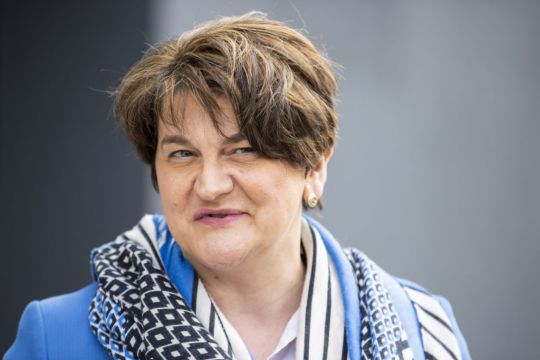Arlene Foster has returned to Northern Ireland Executive business as focus within her party shifts to the race to succeed her as DUP leader and the North's First Minister.
Ms Foster was due to jointly chair a virtual meeting of the devolved powersharing administration on Thursday, less than 24 hours after announcing her planned resignation in the face of an internal revolt against her leadership.
She is standing down as party leader on May 28th and as First Minister at the end of June.
The 50-year-old Fermanagh and South Tyrone Assembly Member has also signalled an intent to quit politics altogether, with Wednesday’s resignation statement speaking of preparing to “depart the political stage”.
Attention now turns to who will replace her at head of both her party and Northern Ireland’s devolved government.
MPs Jeffrey Donaldson and Gavin Robinson, both viewed as moderates, and the more hardline Agriculture Minister Edwin Poots are among the names emerging as potential successors.
Veteran MP and arch Brexiteer Sammy Wilson, who almost ran against Ms Foster when she was elected in 2015, may also consider entering the contest this time round.
There is some speculation that when Ms Foster does depart, the twin roles she currently occupies could be split going forward, with one politician taking on the role of party leader and another being appointed First Minister.
I wish to thank Arlene for her service, sacrifice and commitment to the DUP and Country.
We all wish her well for whatever the future may hold for her and her family.— Edwin Poots (@edwinpootsmla) April 28, 2021
Advertisement
That would potentially allow an MP to lead the party from Westminster while an MLA takes on the First Minister’s job.
While Ms Foster had been under mounting pressure from disgruntled DUP supporters for months, the pace at which her grip on power slipped this week has surprised many.

Her resignation came a day after party colleagues unhappy with her leadership moved against her, with a majority of senior elected representatives signing a letter of no confidence.
Discontent at the DUP’s Brexit strategy was a major factor in the heave, with party rank and file laying some of the blame for the emergence of an Irish Sea border at her door.
Traditionalists from the party’s religious fundamentalist wing also harboured concerns over positions Ms Foster had taken on some social issues.







